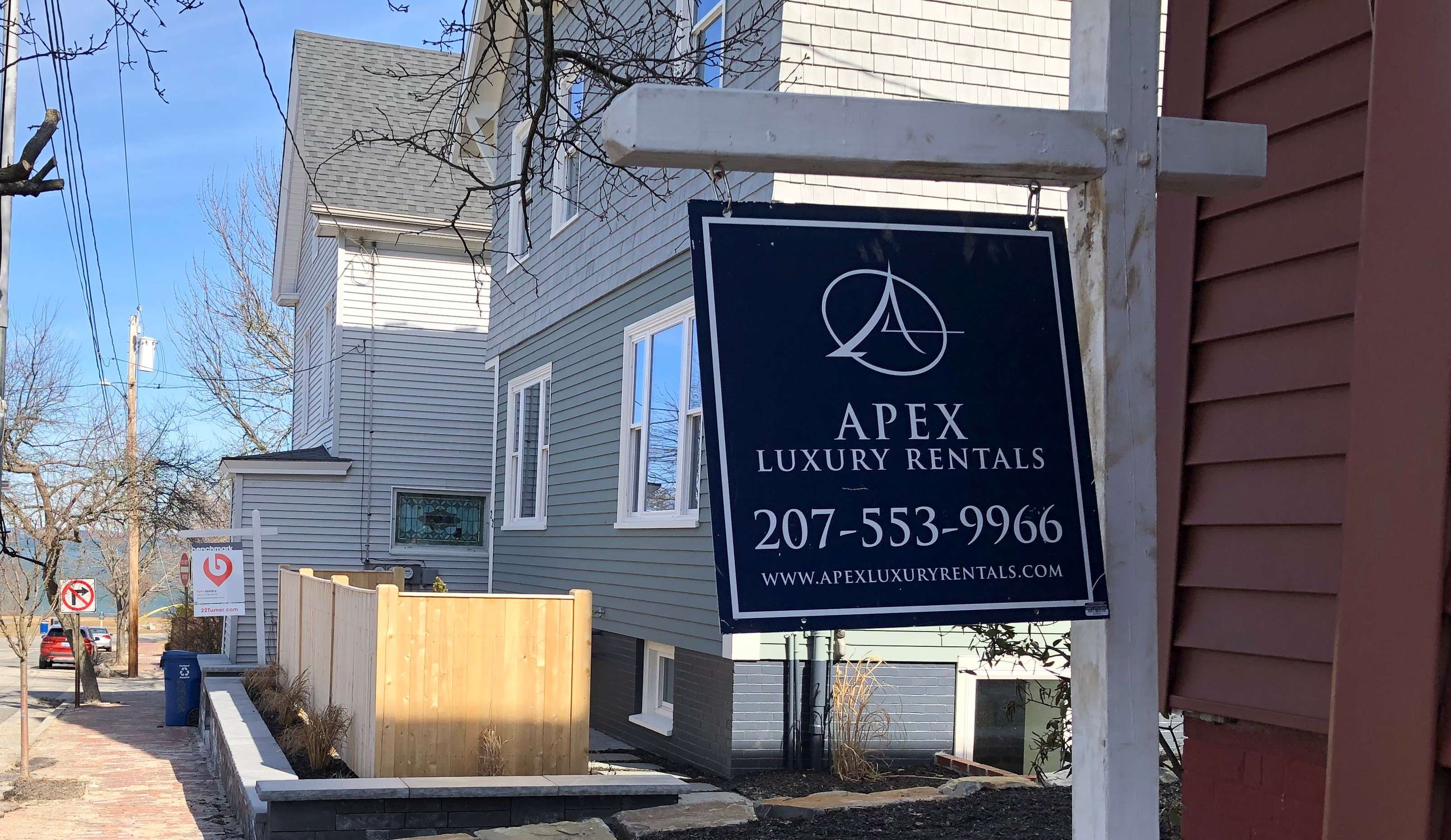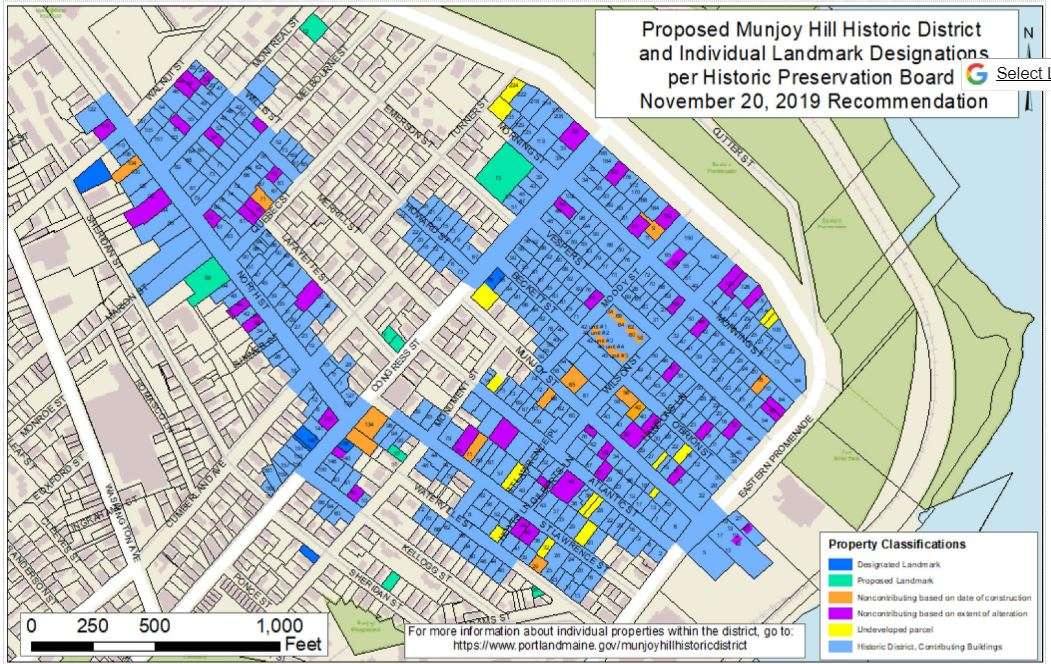
Portland planning board to decide on Munjoy Hill Historic District
 Photo / Maureen Milliken
Development of modern larger apartment buildings on Munjoy Hill spurred concerned about the Portland neighborhood losing its character to development, and some believe making a large part of the neighborhood a historic district will help address the issue.
Photo / Maureen Milliken
Development of modern larger apartment buildings on Munjoy Hill spurred concerned about the Portland neighborhood losing its character to development, and some believe making a large part of the neighborhood a historic district will help address the issue.
More Information
For more than a century, Munjoy Hill was one of Portland's most densly packed working-class neighborhoods. Now it's become an epicenter for an exploding variety 21st century issues — preservation, affordable housing, attraction of young workers to the city, property owner rights, the development boom and more.
The latest iteration of that explosion will go before the planning board tonight when it considers a historic district designation that would cover more than 400 Munjoy Hill properties, most of them privately owned residences.
The planning board will take up the designtation, which has been the topic of two workshop meetings, at its meeting tonight, which begins at 6 p.m. If approved, the district would go to the city council for a final decision.
The designation, along with individual landmark designations for five buildings was approved by the city's Historic Preservation Board in November. Spurred by concerns about modern building development on the hill, accompanied by a spate of tear-downs several years ago, the proposed designation comes after a 2018 conservation overlay that slowed construction until issues could be worked out.
The proposed district includes 427 parcels, representing 49% of Munjoy Hill’s building stock, according to the city. Most of the properties in the R-6 residential zone, but it also includes 10 buildings within the neighborhood’s B-1 or B-1b business zones. Two of those are already designated landmarks. Of the parcels, 376, or 88%, are classified as “contributing," and 51, or 12% are “noncontributing." Contributing means that they meet the criteria, through age and any alternations, to be considered historic.

Preservation, restrictions
The designation is supported by preservation groups, including Greater Portland Landmarks, as well as the Munjoy Hill Neighborhood Association. But it's opposed by a variety of property owners who are concerned about restrictions on repairing and renovating homes that are more than a century old, as well as the growing lack of affordable housing and other issues.
Residents speaking in favor of it at the Feb. 11 planning board hearing said it would add structure to the development in the neighborhood, protect its historic culture, provide guidelines for changes to buildings, slow demolition of older buildings as well as slow construction of "big boxy" multi-family buildings. Many said they're also concerned about the rise in house values, and the number of luxury condos and apartments in the former working-class neighborhood.
But opponents disagree. "A lot of people on the hill decided [a historic district designation] would stop demolitions and stop big box condos," said Carle Henry, a hill resident. "A historic district on the hill does not address those two issues." He said he believes the issues would be better addressed through zoning changes.
Property owners of "contributing" structures — those that are considered to have retained enough historic features to be considered part of the district — would have to get approval from the city before making any improvements or alterations that can be seen from a public way.
Those include:
- Alterations, repair or replacement of windows, doors, storefront modifications, architectural detailing, masonry work (including re-pointing, sandblasting, chemical cleaning; waterproofing, painting where the masonry has never been painted, or removing paint where the masonry historically has been painted), installing or replacing visible roofing or gutters; substitution of original building materials, altering or replacing accessory structures, including garages.
- Additions and new construction, including rooftop additions, dormers or decks; accessory structures; exterior access stairs or fire escapes; antennas and satellite dishes; solar collectors or wind generators.
- Exterior utilities and lighting, including mechanical, plumbing, and electrical, vents.
- Signs and awnings, as well as related lighting
- Site alterations including modifying features other than vegetation, including parking lots, fencing, retaining walls, driveways, paving, and regrading
- Demolition or partial demolition of a “contributing” structure. Approval is not required to demolish a noncontributing building.

Rallying to the cause
Groups on both sides are rallying members to attend the meeting. Both Greater Portland Landmarks, which is a strong supporter of the measure, and YIMBY Portland, which is opposed, have sent email blasts to members in the past week.
"Greater Portland Landmarks strongly believes that the proposed Munjoy Hill Local Historic District is the most effective way to conserve the character of the neighborhood and accommodate public participation in a transparent review process that has proven successful in the West End, Parkside, Old Port, and Congress Street historic districts for 30 years," the organization said in an an email and on its website. "The proposed Munjoy Hill Local Historic District has emerged from a lengthy and inclusive public process. It meets the designation criteria in the city historic preservation ordinance and is consistent with the city’s comprehensive plan, which supports historic preservation as an integral part of the city’s planning strategy."
The preservation group said the district "won't freeze the Hill in time," but, as shown in other districts, development can still happen.
"Our historic neighborhoods are important city assets that should be maintained and enhanced," the organization said. " Along with our food scene, the physical character of the Old Port, West End and Munjoy Hill contribute to Portland’s appeal as a desirable place to live and visit.
It also said the preservation or reuse of historic buildings helps to fulfill the city’s comprehensive plan goals to adopt sustainable building and land use policies, and that the historic district will preserve properties associated with underrepresented communities in Portland.
YIMBY Portland, a group set up to address development issues across the city, in an email March 2 listed several reasons it opposes the district, including a negative affect on the housing shortage. "In 2018, the city introduced a Conservation Overlay District. There has only been one active project initiated on the Hill since the overlay district went into place," the group said. "The Hill has quickly gone from stimulating new housing to becoming stagnant." That limits new property tax revenues, increasing the burden for others.
The group also points out that supporters can self-designate their home, creating a "de facto district" without negatively impacting neighbors and city goals.
Agreeing, disagreeing
Both opponents and advocates cite the city's 2030 Master Plan.
"The 2030 Master Plan has many goals regarding sustainability, climate change and growth. Putting a vibrant neighborhood under a glass dome runs counter to these goals," the YIMBY email said.
Greater Portland Landmarks email said, "Portland’s Plan 2030 supports the stewardship of Portland’s historic, cultural and architectural assets as integral to the city’s planning strategy and was widely supported in public feedback received during the plan’s creation. Design review for alterations and new construction within our historic neighborhoods ensures we will maintain the character that helps support our city’s economic vitality."
Henry is a cofounder of YIMBY Portland, but said in an interview with Mainebiz Tuesday he was speaking as a resident of the neighborhood.
He said he moved to Munjoy Hill about seven years ago because it wasn't in a historic district. He and his wife like older houses, but knew, too, how much work they need. His 1849 house has wooden gutters, some of which are showing rot. If the district is passed, to replace them he'd have to pay a permit fee and get approval, instead of just getting the work done.
"There are many stories like that," he said.
City records show that public comment at meetings, as well as comment received by the city, shows 205 in favor of the district and 63 opposed, though not all of the proponents live on Munjoy Hill. Those on both sides, in many cases, seem to want the same outcomes.
The Munjoy Hill Neighborhood Association says on its website the proposed historic district is "one tool to preserve the neighborhood character, and to protect the remaining 19th and early 20th century working-class residential architecture which characterizes the neighborhood."
It adds, "As a side benefit, it may help retain the existing stock of affordable, workforce and middle-class housing."











0 Comments